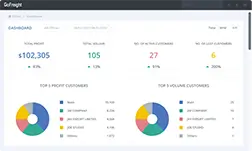In an interconnected world where efficiency is the king of commerce, third-party logistics providers stand as the unsung heroes of the supply chain. They are the invisible cogs turning the global trade engine, ensuring that the right products reach the right destination, at the right time. But who are these pivotal players, and what exactly is their role in supply chain management?
Third-party logistics providers (3PLs), as the term suggests, are specialized companies that manage and execute logistics services on behalf of their clients. They often provide a suite of services encompassing inventory management, fulfillment services, and transportation, sometimes even extending to reverse logistics—the orchestration of product returns and recycling.
The rise of 3PLs is a story of transformation in logistics operations, sparked by the growing complexity of supply chains and the relentless pursuit of cost savings and efficiency in shipping costs. These providers have evolved from mere external helpers to integral partners capable of managing an organization’s entire supply chain, offering not just economies of scale but also specialized industry expertise.
From the expedited shipment of a small ecommerce store‘s products to the seamless fulfillment process of a vast online store, third-party logistics providers are increasingly becoming the linchpin in order fulfillment. Their ability to adapt and provide cost-effective logistics services has cemented their position as a cornerstone in modern supply chain management.
Today, the story of third-party logistics providers is not just about transporting goods but about crafting a customer experience that aligns with the demands of an ever-accelerating world. The party logistics providers have become a vital part of the logistics industry, with the power to enhance or diminish customer satisfaction through their execution of the logistics operations.
In the journey ahead, we’ll unravel the intricate layers of third-party logistics, understand their core functions, and showcase how these entities help businesses navigate the complex waters of global logistics. Whether it’s a manufacturer in need of integrated freight management services or a burgeoning retailer seeking to manage inventory more effectively, the right third-party logistics company can turn logistical challenges into competitive advantages.
Understanding Third-Party Logistics (3PL)
Definition of Third Party Logistics
The concept of third-party logistics (3PL) stretches far beyond the mere transportation of products from one point to another. At its core, third-party logistics refers to the outsourcing of logistics operations to a specialized company that can handle various components of the supply chain. This encompasses inventory management, warehouse space allocation, fulfillment services, and transportation—each an essential spoke in the wheel of modern commerce.
The definition of third-party logistics is rooted in the idea of partnership and efficiency. A third-party logistics provider acts as an extension of a company, taking on the responsibility of ensuring that products are stored, handled, and transported effectively, thereby freeing up businesses to focus on their core competencies. This comprehensive third-party logistics meaning encapsulates not only the physical tasks of moving goods but also the strategic role of optimizing the entire logistics process.
The Scope of Third-Party Logistics Providers
The reach of third-party logistics providers is vast, significantly impacting how supply chains are structured and managed. By offering tailored logistics services, these providers help businesses align their supply chain operations with the fluctuating market demands and increasing consumer demand. They offer a myriad of value added services, from inventory warehousing to shipping strategy advisement, all aimed at enhancing the customer experience.
These providers are at the forefront of innovating fulfillment processes, frequently employing cutting-edge technology like global positioning systems to ensure faster delivery and improved shipping logistics. With their specialized expertise, they can also offer significant cost savings through more efficient inventory management and warehouse space utilization. The scope of third-party logistics providers is ever-expanding, encompassing every aspect of supply chain management to meet the needs of a dynamic ecommerce business landscape.
The Backbone of Supply Chain Management
Integrating 3PL Providers into Supply Chains
In the intricate dance of supply chain management, the integration of third-party logistics providers is akin to introducing a skilled choreographer. These logistics services are not merely supplemental; they are fundamental, driving the rhythm of supply chain efficiency. 3PL providers harmonize various logistics components, ensuring that each step from the manufacturer to the end customer is synchronized for peak performance.
This synergy is realized through meticulous inventory management, where 3PLs deftly balance shipping costs and warehouse space to avoid both excess and deficit. Their ability to navigate the complexities of logistics operations—including transportation services, fulfillment process intricacies, and reverse logistics—translates into seamless movement within the entire supply chain.
In the grander scope of supply chain operations, these providers are the strategic partners who understand the nuances of cost-effective solutions, the importance of shipping orders with precision, and the growing necessity for faster delivery to meet increasing consumer demand. The integration of 3PL services is not a mere outsourcing arrangement; it is a strategic decision that enhances logistics management and propels businesses towards greater efficiency and customer satisfaction.
Third-Party Logistics Providers: Services and Solutions
The suite of services and solutions offered by third-party logistics providers is vast and varied, tailored to fortify the entire supply chain from end to end. Here are a few key examples of third-party logistics services:
- Order Fulfillment: The bread and butter of 3PL services, encompassing order processing, fulfillment centers operation, and shipping logistics to ensure products reach customers promptly and accurately.
- Transportation and Logistics Services: An expansive range that covers everything from freight forwarders handling complex shipment needs to integrated freight management services that consolidate various transportation modes for efficiency and cost savings.
- Inventory Management: Advanced systems and expertise that allow for real-time tracking, predictive analysis, and strategic warehouse space utilization, all focused on maintaining the right balance of stock levels.
- Reverse Logistics: Handling returns with a focus on customer satisfaction and cost-effective strategies, turning potential losses into opportunities for value-added services and customer experience enhancement.
By leveraging these third-party logistics services, businesses are equipped to respond to market changes swiftly, manage inventory warehousing more effectively, and achieve cost savings while maintaining, or even improving, customer satisfaction. Each service is a cog in the greater machinery of supply chain management, proving that third-party logistics providers are indeed the backbone of the industry.
Key Components of Third-Party Logistics
Inventory Management and 3PL
The art of inventory management is a central feature in the domain of third-party logistics. It requires a delicate balance, a strategic approach that a third-party logistics provider masters with precision. They understand the subtle interplay between having enough stock to meet demand and the drawbacks of excess, which can escalate shipping costs and warehouse space usage unnecessarily.
Third-party logistics providers excel in optimizing inventory levels, utilizing sophisticated software that forecasts demand, tracks stock movement, and signals when it’s time to reorder. This adept management prevents stockouts and overstock, contributing to significant cost savings and streamlining supply chain operations. In essence, 3PL providers transform inventory management from a challenging task into a competitive advantage for businesses, ensuring that fulfillment services operate without a hitch and customer orders are met consistently, fostering customer satisfaction.
Fulfillment Services Unpacked
Fulfillment services are the cornerstone of third-party logistics, encompassing the entire journey from fulfillment centers to the eager hands of the end customer. The fulfillment process is a comprehensive system designed by 3PL providers to ensure that online store purchases are picked, packed, and shipped in the most efficient manner possible.
Starting within the sophisticated ecosystem of a fulfillment center, orders are processed through a meticulous system that minimizes labor costs and maximizes accuracy. Products are stored in an organized fashion, making use of strategic warehouse space to facilitate easy access and swift movement. From generating the shipping label to the final step of dispatching the package, third-party logistics providers manage each aspect of the shipping process. This streamlined approach not only ensures faster delivery to meet increasing consumer demand but also maintains cost-effectiveness, illustrating why 3PL services are a critical component in the modern ecommerce business model.
Reverse Logistics and Sustainable Practices
Reverse logistics is not simply about handling returns; it’s a nuanced and essential part of third-party logistics services that caters to customer satisfaction and environmental sustainability. When a customer places an order, the possibility of a return is an inherent aspect of the ecommerce store experience. 3PL providers manage these returns with a focus on recycling and reusing products whenever possible, contributing to sustainable business practices.
This element of third-party logistics is about creating a circular economy, where goods are brought back into the supply chain, minimizing waste and reducing the need for raw materials. Effective reverse logistics can also forge stronger customer relationships, as buyers feel more confident in a purchase knowing that the returns process is simple and environmentally conscious. Furthermore, it represents a strategic opportunity for businesses to analyze return patterns and data to improve their products and fulfillment processes, ultimately enhancing the overall customer experience.
Benefits and Strategic Advantages in Bullets
Cost Savings and Efficiency Gains
Partnering with a third-party logistics company offers a bevy of financial and operational benefits, including:
- Reduction in Shipping Costs: By leveraging their extensive networks, third-party logistics providers can negotiate better rates, consolidate shipments, and offer more affordable freight services.
- Operational Efficiency: Outsourcing logistics can streamline your supply chain, allowing for faster order fulfillment and more efficient inventory management.
- Economies of Scale: Third-party logistics have the capacity to offer cost-effective solutions thanks to their volume of operations, passing on savings to your business.
- Technology Access: Gain access to state-of-the-art technology for tracking, managing inventory, and optimizing the shipping process without the capital investment.
- Adaptability and Scalability: 3PL providers can quickly adjust to fluctuating demand, helping your business scale operations up or down as needed, providing flexible warehouse space and resources.
- Core Competencies and Logistics Expertise
By tapping into the industry expertise of third-party logistics providers, businesses can focus on what they do best:
- Leverage Expertise: Benefit from the logistics partner’s years of experience and knowledge, particularly in complex areas such as global shipping logistics and customs regulations.
- Value-Added Services: Utilize additional offerings like kitting, custom packaging, and reverse logistics to enhance your product and service offerings.
- Concentration on Business Growth: Redirect resources and attention from logistics to areas like product development, marketing, and customer engagement.
- Risk Management: Third-party logistics companies often have better risk assessment capabilities and solutions in place to manage and mitigate risks associated with the supply chain.
Enhancing Customer Experience Through Third-Party Logistics
The influence of logistics providers on customer satisfaction is significant and multifaceted:
- Faster Delivery Times: Efficient logistics operations lead to quicker delivery, increasing customer satisfaction and loyalty.
- Improved Order Accuracy: Advanced systems ensure orders are fulfilled accurately, reducing errors and returns.
- Enhanced Transparency: Real-time tracking and updates enhance trust and communication with customers.
- Hassle-Free Returns: Streamlined reverse logistics processes make returns easy for customers, a critical factor in e-commerce success.
- Customized Experiences: The ability to offer personalized services, such as gift wrapping or special notes, through fulfillment services adds a unique touch to customer orders.
Choosing the Right Third-Party Logistics Provider
What to Look for in Third-Party Logistics Services
Selecting the appropriate third-party logistics provider is a pivotal decision for your business. Here’s what you should consider:
- Scalability: Can they accommodate your current and future logistics needs as you grow?
- Experience: Do they have a proven track record with businesses similar to yours in size or industry?
- Service Range: What logistics services do they offer? Can they handle freight forwarders, inventory management, and fulfillment services?
- Customer Service: Is their customer support responsive and helpful? Do they provide dedicated account management?
- Financial Stability: Are they financially healthy and able to invest in long-term partnerships?
- Compliance and Security: Do they follow industry regulations and have robust security measures in place for your data and goods?
- Location: Is their warehouse space strategically located to optimize your supply chain?
- Third-Party Logistics Providers and Technology
The infusion of technology in third-party logistics is essential for operational excellence:
- Global Positioning Systems (GPS): Offers real-time tracking of shipments, contributing to transparency and security.
- Shipping Logistics Platforms: Facilitate efficient routing, shipping label creation, and order tracking.
- Warehouse Management Systems (WMS): Enhance inventory management and order fulfillment precision.
- Data Analytics: Utilized for forecasting demand and optimizing stock levels.
- Integration Capabilities: Ensure seamless connection with your own systems, like your ecommerce store or online store.
Third-Party Logistics in Action: Real-World Examples
Case Studies of Successful Third-Party Logistics Partnerships
When businesses partner with experienced third-party logistics providers, the benefits can be substantial and multifaceted. Here are a few case studies showcasing these successes:
Streamlining Ecommerce Fulfillment
An ecommerce business faced challenges with their fulfillment process, struggling to manage inventory and ship orders efficiently. By outsourcing to a 3PL provider specializing in ecommerce fulfillment, the company could leverage the provider’s warehouse space and inventory management systems. This partnership resulted in a cost-effective, scalable solution that supported the ecommerce store during peak seasons and increasing consumer demand, leading to faster delivery times and improved customer satisfaction.
Global Supply Chain Integration
A manufacturer expanded into new international markets, complicating their supply chain management. They engaged a third-party logistics company with integrated freight management services and a global network of fulfillment centers. This strategic move ensured cost savings in shipping costs and labor costs, while the logistics partner’s expertise in local regulations streamlined the shipping process. Additionally, value-added services such as custom packaging and kitting further enhanced the end customer experience.
Reverse Logistics Efficiency
A retailer grappling with high returns sought a third-party logistics provider with reverse logistics capabilities. The selected 3PL services included a robust process for handling returns, refurbishments, and recycling, which improved inventory warehousing and reduced waste. This sustainable approach not only offered cost savings but also resonated with environmentally conscious consumers, bolstering the retailer’s reputation.
Specialized Transportation Solutions
A company needing to transport sensitive goods—requiring temperature control and careful handling—partnered with a third-party logistics service that provided specialized freight services. This logistics company’s industry expertise and use of a global positioning system (GPS) for real-time tracking assured the safe and timely delivery of products.
These examples illustrate the pivotal role third-party logistics providers play in optimizing the entire supply chain, from fulfillment services to transportation services. Companies can focus on their core competencies and growth while leaving the complex logistics operations to the experts, thereby enhancing the customer experience and achieving operational excellence.
Future Trends in Third-Party Logistics
The Road Ahead for Third-Party Logistics Providers
The logistics industry is on the cusp of a transformative era, driven by rapid technological advancements and shifting market dynamics. The role of third-party logistics providers (3PLs) is evolving, with future trends poised to reshape the landscape of logistics services.
Increased Integration of Advanced Technologies
3PLs are increasingly integrating advanced technologies like Artificial Intelligence (AI), machine learning, and the Internet of Things (IoT) to optimize logistics operations. AI algorithms enhance inventory management by predicting demand, while IoT devices offer real-time tracking of goods throughout the supply chain. This results in heightened efficiency, improved order fulfillment, and significant cost savings.
Ecommerce as a Growth Catalyst
The surge of ecommerce business models has magnified the importance of efficient fulfillment services. As ecommerce stores require swift order fulfillment to meet customer expectations for faster delivery, 3PLs are stepping up by offering customized logistics solutions, including same-day delivery services.
Sustainability and Green Logistics
Sustainability is transitioning from a trend to a necessity. Forward-thinking third-party logistics providers are adopting green practices, focusing on reducing emissions and waste within the supply chain. By implementing sustainable practices, such as eco-friendly packaging and optimizing delivery routes, 3PLs can contribute to a healthier planet while also appealing to environmentally conscious consumers.
Collaboration and Flexible Supply Chains
The future will see an increase in collaborative efforts between third-party logistics providers and businesses. As unpredictability becomes the new norm, flexible supply chains that can adapt to changes rapidly are critical. 3PLs that offer flexibility and scalability will become invaluable partners in managing supply chain operations.
Leveraging Data Analytics for Decision Making
Data is becoming the cornerstone of logistics services. Third-party logistics companies that harness the power of data analytics can offer insights that drive strategic decision-making, optimize shipping costs, and enhance the customer experience.
The future for third-party logistics providers is vibrant and challenging. By embracing these emerging trends, they can not only secure their relevance but also play a pivotal role in shaping the future of global supply chains and ecommerce success.
Conclusion: The Ever-Evolving World of Third-Party Logistics
As we encapsulate the journey through the ever-evolving world of third-party logistics providers, it is unmistakable that they hold transformative power in supply chain management. These entities have become the propellers of efficiency, innovation, and strategic advantage within the global supply chain. The integration of 3PL providers has not only streamlined logistics operations but also offered cost savings and enhanced customer satisfaction.
The logistics industry is in a constant state of flux, driven by technological advancements and changing consumer demands. For businesses, the strategic importance of adapting to logistics trends cannot be overstated. It is a critical factor for future success and sustainability. The agility to adopt new logistics services, embrace technological integrations, and understand the nuances of inventory management and fulfillment services will determine the leaders in the marketplace.
As we look forward, the role of third-party logistics providers in crafting a responsive, sustainable, and efficient supply chain is paramount. They are not just service providers but strategic partners in navigating the complexities of modern commerce. Their expertise and innovations are vital for businesses aiming to thrive in the dynamic landscape of global trade and consumer expectations.





